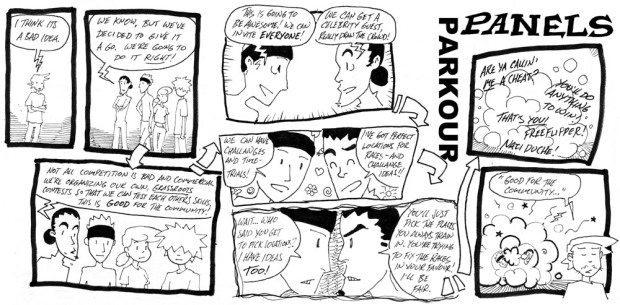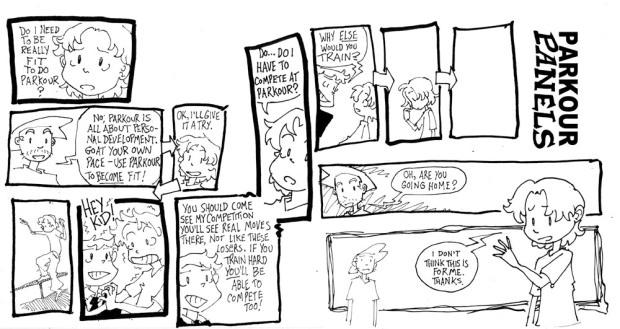Dear parkour friends,
I tend to favor novelty, so I’m not a huge fan of turning everything into sport. And my concerns and findings were often expressed in my comics. But as I dig deeper, I am finding some disturbing links between competition and depression that parkour practitioners might be interested in.

But first, let me introduce myself. I’m doing some research on the book that is to come out of my PhD. I’ve recently completed a study about parkour and the people who practice it with samples from Australia, America, Canada, England, France, Denmark, Russia and Ukraine (with some brief visits and glimpses into other places). One of the things I wrote and drew about – I’m the guy who is behind the Parkour Panels – is how parkour can be practiced by those who are strictly against competition, as well as those who think that competition is good and, even, inevitable. Many of you will have met me. For those who haven’t: Hi!

Panel from all the way back 2011….
Now that my PhD is in the bag I’m looking to expand on some of those ideas. While reading has been great, I’m currently going through a book which is central to this topic. It’s called The Happiness Industry, and written by Dr. William Davies, an American sociologist. This book summarizes much of the more academic research I found on the topic of adding competition to all kinds of activities: from parkour to running entire nations. As I took notes I realized that the content is really important for those in parkour communities – particular in America, Canada, Australia and the UK where the sportification of parkour is well under way. I thought I’d share some of my notes with you…
Having done a great deal of research on the subject, here is what Dr. Davies has to say.
” … It transpires that competition and competitive culture, including that of sport, is ultimately related to a disorder that was scantly discussed in 1977 but which has become a major policy concern by the end of the century. As the 1970s drew to a close, Western capitalist countries stood on the cusp of a whole new era of psychological management. The disorder at the heart was depression. ”
Davies points out that the competitive societies inherently rate greater levels of social inequality. Where competition is limited in the social sphere (like Scandinavia) rates of depression are much lower. In America and the UK, where competition is promoted as a social virtue, rates of depression are epidemic.
“Yet there is more to this than just a statistical correlation. Behind the numbers, there is troubling evidence that depression can be triggered by the competitive ethos itself, afflicting not only the ‘losers’ but also the ‘winners’… That competition makes many people ‘seem inferior’, has been proved far more valid than even left-wing 1970s school teachers could have imagined; it also tells them that they are inferior.”
What follows are a number of case studies that have surfaced over the last few years that show that elite athletes are highly prone to mental illness, particularly depression. I won’t type out this long section, instead I’ll just give you these links – directly related to his examples.
“A study conducted by Georgetown University found that college footballers are twice as likely to experience depression as non-footballers. Another study discovered that professional female athletes display similar personality traits as those with eating disorders, both linked to obsessive perfectionism. And a series of experiments and surveys conducted by the American psychologist Tim Kasser has revealed that ‘aspirational’ values, oriented around money, status and power, are linked to higher risk of depression and lower sense of ‘self-actualization’. Whenever we measure our self-worth relative to others, as all competitions force us to, we risk losing our sense of self-worth all together. One of the sad ironies here is that the effect of this dissuade people, including schoolchildren, from engaging in physical exercise all together” (studies cited).

“Perhaps it is no surprise, then, that society such as America’s, which privileges a competitive individual mindset at every moment in life, has been thoroughly permeated by depressive disorders and demand for anti-depressives. Today, a third of adults in the United States and close to half in the UK believe that they occasionally suffer from depression…”
In the process of working on my PhD I found many people who unquestioningly pushed towards competition in practice. I’ve also heard a lot of slander for those who chose to practice on their own terms – that they weren’t serious or that their scene was not as evolved.
I hope that this can broach the divide a little. Give us all cause to pause and consider: If parkour is practiced for self-improvement, what role do competitions play in this process. And, if competitions are about business, how far are we willing to go in marketing our practice… particularly if it hurts the students we are trying to inspire and makes it inaccessible to others.
For more about the connection between depression and competition, click on the links in this sentence.
love!
– Pava
I’m so glad to have come across your article. I’ve been feeling this way about the idea of competitions in our practice for a long time now (and I have voiced this opinion of mine on many occasions, often met with pro-competition rebuttals). I look forward to reading more of your research on this in the future.
LikeLiked by 1 person
Thanks Kurt, its nice to be able to blog more. And it’s really great to see that there’s an audience out there.
LikeLike
You should check out the Houston parkour community or the comunities in the southwest in general. We’re fortunate to have one of the more welcoming parkour communities in the country.
LikeLiked by 1 person
Thanks Dave, I’d love to pay another visit. Last time was way, way too short and US is really interesting.
LikeLiked by 1 person
Your friend Cameron is here, too. 😉 You’re welcome anytime. Great article, by the way.
LikeLike
Always good to hear from you, mate!
LikeLike
Thank you for the post. It helps those of us who are dedicated to growth and development through movement and teaching to know we are not alone. With sooo much emphasis on being first and winning it can be a struggle for people to get out of there shells and even want to try something new on the athletic side. Self defeat is way too easy when you have the coaches promoting and only helping the loudest students. T B.A.S.E. we try to be as inclusive as possible and allow different platforms for everyone to develop from. One of the most important things I was privileged to experience when I first trained in London in 2009 with PKG, was the amazing friendships and support network that made up the community at the time. This feeling was the core of my experiences in France as well with Chau, Yann and Laurent as I’m sure many will concur. The element of family and the connection for me that seems stronger than blood is the work ethic and strength that can only be achieved from struggling, sweating, failing together. Ego has no place in unified growth and will eventually leave show offs and competition driven individuals empty and lonely. Of course we can ALWAYS push to be better, we can always strive for something more but we should also understand that humility and helping others holds its own rewards as well. Thanks again for the post Alex. You are welcome to swing by and visit Indiana if you are available after Urban Movements visit in Texas plus that will put you in line with Parkour Horizons and Wisconsin Parkour as well 🙂
LikeLiked by 1 person
It’s really warming to see how this post has reached so many people. It really does feel like the competitive ethos is huge, but bigger still when it comes to monopolizing attention. I have been pretty quiet about my findings until quite recently (embargo until completion), this shows there’s an audience out there – and people are interested. I’ll definitely write some more.
LikeLike